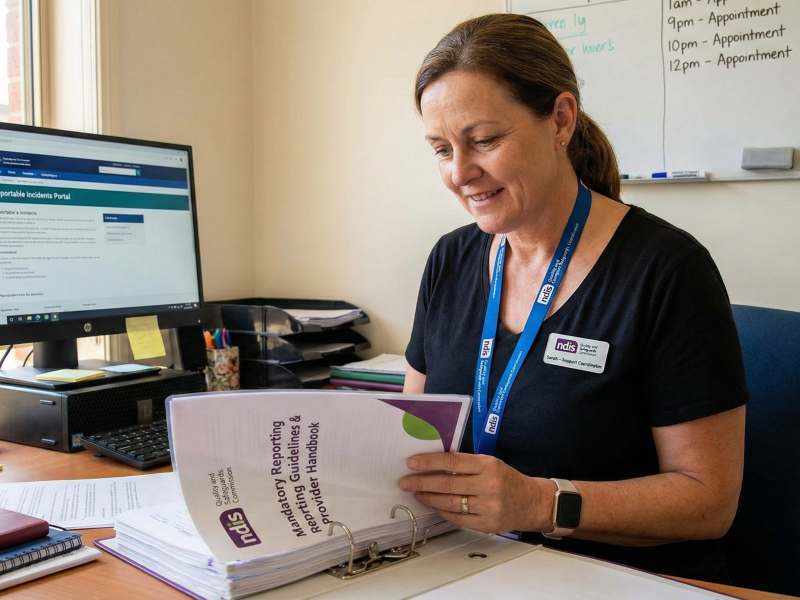The National Disability Insurance Scheme (NDIS) provides funding to support Australians with disabilities. This funding allows NDIS Participants to access appropriate services and enhance their quality of life. NDIS funding is individualised and distributed into different categories so that Participants may receive suitable support.
It is quite crucial for NDIS Participants and service providers to know about these categories of funding to reap the maximum benefits of the scheme, and make suitable decisions about support services.
NDIS Funding Categories
NDIS funding is organised into major divided categories, each with a distinct function. The categories are designed to provide Participants with financial support for daily needs, home adjustments, specialised therapy, and skill acquisition. The main categories are:
- Core Supports – Needs for daily living and community engagement.
- Capital Supports – Home adjustments and equipment.
- Capacity Building Supports – Skill acquisition and independence.
- Recurring Supports (PACE Plans Only) – Recurring support to Participants with a particular long-term need.
NDIS Core Supports
Core Supports assist Participants in daily living; promoting greater autonomy and social involvement. The category is versatile so that funds are utilised across varied support areas according to the individual Participant’s need.
NDIS Core Supports covers:
- Assistance with Daily Life – Personal, meal, and domestic care.
- Transport – Transport to attend school, work, or access the community.
- Consumables – Day-to-day items like continence aids and disability equipment.
Support for Social and Community Participation – Assistance to participate in leisure and community activities.
NDIS Capital Supports
Capital Supports offer funding for long-term investments. This is a pathway to enhance the quality of life for a Participant. This category has more rules and is not typically flexible.
NDIS Capital Supports encompasses:
- Assistive Technology – Products and technologies such as wheelchairs, continence supplies, hearing aids, and communication aids.
- Home Changes – Modifications to the home environment such as ramps, grab rails, and accessible bathrooms.
- Specialist Disability Accommodation (SDA) – Purpose-designed homes for Participants with high support needs.
NDIS Capacity Building Supports
Capacity Building Supports assist Participants in building skills and independence across various aspects of life. These funds are different from Core Supports, as they are used for particular purposes and cannot be swapped between categories.
Important areas of NDIS Capacity Building Supports include:
- Support Coordination – Help with putting and managing an NDIS plan in place.
- Improved Daily Living – Physiotherapy and occupational therapy services.
- Finding and Keeping a Job – Training and support related to employment.
- Improved Health and Wellbeing – Exercise, dietitian services, and personal training.
- Improved Learning – Further education and skill development support.
- Improved Life Choices – Plan management support and financial management.
- Improved Relationships – Social skill development and behavior support.
NDIS Recurring Supports (PACE Plans Only)
With the advent of PACE plans, certain Participants are provided with recurring supports, which provides ongoing funding for necessary services. These Recurring supports encompass ongoing therapy, assistive technology maintenance, and specialised care that require long-term funding certainty.
Want to Attract More NDIS Clients?
Get expert advice on how to market your services, connect with clients, and grow your practice.
How to Book a Support Worker with NDIS Funding
Booking a support worker through the NDIS involves understanding the management style of the Participant’s individual NDIS plan, as each approach has distinct processes:
NDIA-managed Participants
When a Participant’s NDIS plan is managed by the National Disability Insurance Agency (NDIA), they are required to use only registered NDIS providers for their supports. Management of services and bookings is conducted through the myplace Participant portal, which has been designed specifically for this purpose.
Through the myplace portal, Participants can view available registered providers, check their availability, and arrange bookings in line with their individual support needs.
Plan-managed Participants
Participants with a plan-managed NDIS arrangement have greater flexibility in choosing providers, as they can engage both registered and unregistered providers. In these cases, a plan manager is responsible for managing the financial aspects of the plan, including processing invoices and making payments to service providers.
This arrangement enables Participants to focus on selecting support workers or services that best align with their needs, without the constraint of choosing only from registered providers.
Self-managed Participants
Self-managed Participants take full responsibility for engaging and paying their own support workers. This means they can directly employ staff who best suit their support requirements, negotiate payment rates, and decide on work arrangements such as hours and conditions.
Self-management offers NDIS Participants the highest level of autonomy, allowing them to tailor their supports to be more individualised and flexible to their needs.
To source support workers, Participants can navigate through an assortment of resources such as NDIS provider lists, online marketplaces for support services, or contact local disability support networks. These resources present a wide range of options for NDIS Participants to find committed and qualified workers to boost welfare and independence.
Referrals Start With Reputation – We’ll Help You Build Both
From networking tips to service refinement, we guide NDIS providers toward lasting impact.
Conclusion
The NDIS funding categories offer a systematic and organised method of financial assistance, enabling Participants to live more independently. The categories are meant to enable access to necessary services and assist individuals in acquiring important life skills. By learning about the different funding categories, Participants can efficiently optimise their available funds, ensuring they receive the appropriate support that suits their individual needs.
The three broad categories—Core Supports, Capital Supports, and Capacity Building Supports—each have different functions and are an important part of a person’s overall NDIS plan. Core Supports assist with daily living and core services, while Capital Supports are concerned with investments in equipment and home adjustments. Capacity Building Supports, however, are intended to build up skills and enable more independence in the long term.
A well-structured and organised NDIS plan may end up having some major and positive impacts on people with disabilities. This enables them to live comfortably and accomplish their objectives in a friendly and relaxed setting.
FAQs
What are the levels of NDIS funding?
NDIS funding is categorised into Core Supports, Capital Supports, and Capacity Building Supports, each addressing different lifestyle and support needs of NDIS Participants.
What are the three categories of the NDIS payment system?
The NDIS payment system includes three funding management options: NDIA-managed, Plan-managed, and Self-managed, each offering different levels of choice and control over how supports are arranged and paid for.
How to get NDIS funding?
Australians with disability can apply for access to the NDIS by filling an Access Request Form and attaching supporting documents, then sending the Form to the NDIA. The NDIA will then assess the applicant’s eligibility for the scheme.
How does NDIS work?
The NDIS provides funding to NDIS Participants through individualised plans, which are designed to support their specific goals and needs. Funding is allocated across different support categories, and Participants can use it to access services that help them improve independence, participate in the community, and achieve their personal outcomes.
What does NDIS pay for?
The NDIS funds reasonable and necessary supports that help participants achieve their goals. This can include personal care, support to participate in the community, assistive technology, therapies, support to find or keep a job, and home modifications, depending on each participant’s individual needs and plan.


